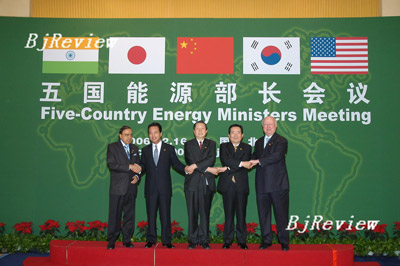
Asia has become one of the major oil-consuming regions in the world, with its consumption accounting for over 40 percent of the world total. China, Japan and South Korea, the major oil-consuming countries in Asia, have respectively become the second, third and seventh largest oil consumers in the world. Analysts forecast that the rate of increase in Asia's energy demand will top all others in the next 20 years.
China, while a big oil producer, has become a net oil importer since 1994 because of its rising energy demand driven by its rapid economic development.
Japan and South Korea, two East Asian countries that lack oil resources, completely depend on imported oil. Furthermore, the two countries rank first and second, respectively, in the world in the consumption of natural gas.
Based on the current trend of increasing energy demand, the dependence of Asian countries on imported oil is expected to rise from 62 percent in 2000 to 74 percent by 2010, which will make Asia the center of the world oil consumption market, replacing North America.
Faced with such a tough energy situation, most Asian countries have worked out or adjusted their energy strategies in both the regional and global arenas. These include developing relations with major oil producers, seeking new energy sources by developing oil and natural gas resources in the global sphere, repairing and expanding energy transportation pipelines, and supporting large-scale state-owned energy companies to expand overseas and enter the international market.
This will inevitably lead to competition and contradictions among some big Asian energy consumers, which will in turn affect their bilateral relations and the stability and development of the entire region.
For example, the energy conflict between China and Japan has become more public and has escalated. On the eastward extension of Russia's oil pipeline in Siberia, the two countries have carried out intensive competition, trying to get the pipeline to run to their countries. The rivalry between the two has also occurred in the development of the oil resources in the East China Sea. It has been determined that the continental shelf of the East China Sea might be one of the richest oil fields in the world.
In the South China Sea area, China, Viet Nam, the Philippines, Malaysia, India, Indonesia and some other regional countries have also competed in tapping oil and natural gas resources there. As two newly arisen developing countries in Asia, China and India greatly depend on energy imports. In recent years, the two countries have encountered some conflicts in their energy resource development in the Middle East, Central Asia, Africa and South America.
The collaboration among Asian countries in the energy field has been far from that of Western countries. As Asian countries have relatively limited sources of energy, the oil market in Asia is rather fragile, which has produced higher energy prices in Asia than in other international markets and damaged the common interests of all Asian countries.
Since 1992, Asian countries have paid $1 to $1.50 per barrel more for oil from the Middle East compared to the European and U.S. markets, and such circumstances have expanded to liquefied natural gas and petroleum gas products. It is estimated that Asian oil consumers have been overcharged $5 billion to $10 billion by oil-producing countries every year.
| 